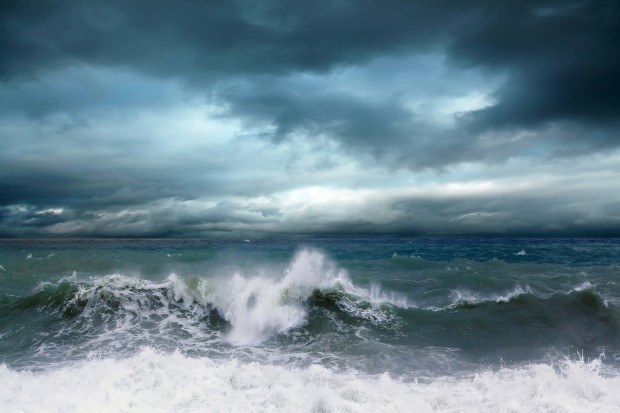Hamburg, Germany’s biggest port, recorded its heaviest storm surge in 37 years as the low- pressure weather system Xaver swept through northern Germany, paralyzing air, rail and ship traffic.
The water rose four meters (13 feet) above the medium high- tide level, the second-highest on record, flooding the port area as well as quayside streets and squares, according to Hamburg’s interior ministry.
“This is the highest level we’ve seen since 1976,” spokesman Thomas Butter said by phone today. “It was higher than the devastating flood in 1962, but dikes and disaster control have significantly improved since.”
The city closed 38 flood gates in advance of high tide this morning to protect citizens from a repeat of the devastation in 1962, when the North Sea and Elbe River Flood claimed more than 300 lives and submerged large parts of the city. No casualties or injuries were reported this time, Butter said.
Hafencity, the old port in which warehouses have been replaced by commercial and residential areas and dubbed Europe’s largest inner-city development project, was partially flooded by the tidal waters. Hamburg handles about 9 million standard containers a year, making it Germany’s biggest port and export hub.
Cordoned Off
Ship traffic at the port was halted throughout the night and police cordoned off the streets of the harbor area to prevent people and cars getting swept away. Hamburg Airport canceled about 100 of 400 takeoffs and landings by the early afternoon and was expecting further cancellations and delays, it said in an e-mailed statement. Deutsche Lufthansa AG canceled 76 flights serving Hamburg, Bremen, Brussels and Scandinavia.
Deutsche Bahn AG halted its long-distance trains via the northern state of Schleswig-Holstein, including cross-border connections to Denmark. It also stopped the Hanover-Bremen service in the state of Lower Saxony, according to its website.
In Hamburg’s western district of Blankenese, residents cleaned up the quayside street with brooms and pushcarts after the tidal surge left it scattered with floating refuse.
Erke Kurmies, who lives in a house on the riverfront, said wooden planks and the high water pressure acted like a battering ram, breaking open several garage doors. “But the surge wasn’t as bad as 1976, when you could see Christmas trees floating in living rooms,” Kurmies said.
Storm Surge
Hamburg, situated on the River Elbe, is bracing for another smaller storm surge to hit at about 6 p.m. tonight, with water levels expected to rise about 3 meters above the medium high- tide level, interior ministry spokesman Frank Reschreiter said by phone.
Xaver hit Scotland yesterday, paralyzing the rail network before heading south and across the North Sea to the Netherlands, Germany and Denmark. The weather system reached the Baltics this morning, where it will abate, according to the German Weather Service.
Thousands of people were moved from English coastal areas last night and the River Thames flood barrier protecting London was closed after warnings of the worst tidal surge in 60 years.
The U.K. Environment Agency reduced the number of severe flood warnings to 14 as of 1:22 p.m. local time as the brunt of the storms passed. The agency plans to reopen the Thames Barrier at about 4:30 p.m. once water levels on each side have equalized, it said on its Twitter account.
Extreme Flooding
The low pressure system produced wind speeds of more than 180 kilometers (112 miles) an hour in the Scottish highlands, while 158 kilometer an hour were the strongest gusts measured on the German coast, the German Weather Service said in an e-mail.
Extreme flooding caused the repeated closing of locks on both ends of the Kiel Canal, the world’s busiest artificial waterway, the Brunsbuettel-based branch of federal waterways and shipping administration WSV said on its website. The canal links the North Sea with the Baltic Sea through Schleswig-Holstein.
Commuter traffic in Berlin and Potsdam was disrupted because of storm damage along the train tracks, Deutsche Bahn’s S-Bahn Berlin GmbH said on its Twitter account. The German capital saw the first heavy snowfall of the winter, with groups of tourists taking shelter from the snowfall in underground stations at Pariser Platz, leaving the square in front of the Brandenburg Gate deserted for most of the morning.
In Poland, power supply was cut to as much as 400,000 households with wind reaching 135 kilometers an hour in some parts. Three people died when a tree fell on a car in the northern part of the country, Polish Press Agency said, citing data from the Ministry of Administration and Digitization. LOT Polish Airlines SA canceled several flights, while firefighters intervened over 1,500 times since midnight, the carrier said.
–With assistance from Rodney Jefferson in Edinburgh, Richard Weiss in Frankfurt, Douglas Lytle in Prague, Stefan Nicola in Berlin, Marek Strzelecki in Warsaw and Fred Pals in Amsterdam. Editors: Angela Cullen, Tom Lavell





















 Allianz Built an AI Agent to Train Claims Professionals in Virtual Reality
Allianz Built an AI Agent to Train Claims Professionals in Virtual Reality  Winter Storm Fern to Cost $4B to $6.7B in Insured Losses: KCC, Verisk
Winter Storm Fern to Cost $4B to $6.7B in Insured Losses: KCC, Verisk  Earnings Wrap: With AI-First Mindset, ‘Sky Is the Limit’ at The Hartford
Earnings Wrap: With AI-First Mindset, ‘Sky Is the Limit’ at The Hartford  Experts Say It’s Difficult to Tie AI to Layoffs
Experts Say It’s Difficult to Tie AI to Layoffs 